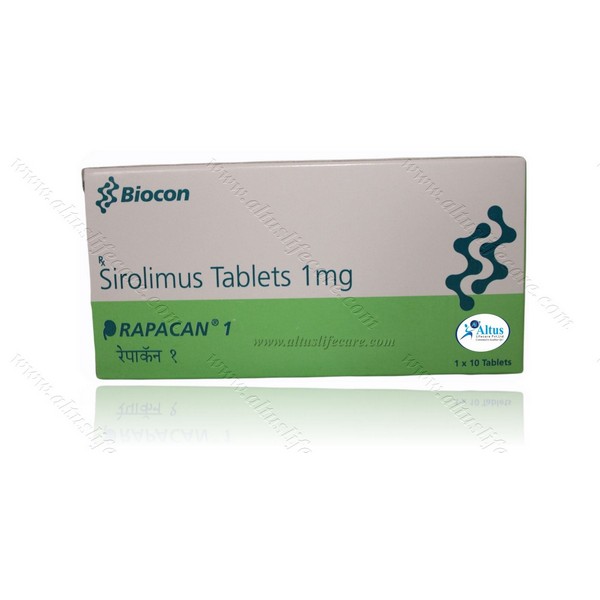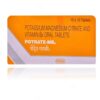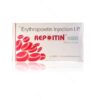Need Help? Call us at: +91 9002 1002 33 (9:00 AM - 5:00 PM)
Email us: info@altuslifecares.com
No products in the cart.
Return To ShopNo products in the cart.
Return To Shop$185.90 – $737.18Price range: $185.90 through $737.18
Rapacan Tablet is used for prevention of organ rejection in transplant patients. It regulates the body’s immune response, so the body can accept the new organ.
Call : +91 9002 1002 33
| COUNTRY OF ORIGIN | India |
|---|---|
| DOSAGE FORM | Tablets |
| EQUIVALENT BRAND | Rapamune |
| GENERIC NAME | Sirolimus |
| INDICATION | Prevention of kidney transplant rejection |
| MANUFACTURER | Biocon Ltd |
| PACKAGING | 10 tablets in 1 strip |
| COMPOSITION | Sirolimus (1mg) |
| PACK SIZE | 50 Tablet/s, 100 Tablet/s, 150 Tablet/s, 200 Tablet/s |
Rapacan Tablet is used for prevention of organ rejection in transplant patients. It regulates the body’s immune response, so the body can accept the new organ.
Rapacan 1mg & 2mg Tablet must be taken in a dose and duration as per the prescription. It can be taken with or without food but make sure to take it at about the same time every day. An overdose of this medicine may have serious side effects on the body.
Common side effects of this medicine include edema, increased blood lipid level, high blood pressure, increased level of creatinine, abdominal pain, diarrhea, headache, fever, urinary tract infection, anemia, nausea, joint pain, and thrombocytopenia. If any of the side effects persist or bother you, consult the doctor immediately. Inform the doctor immediately if you experience any allergic reactions such as rash, shortness of breath, coughing, swelling, etc.
Before taking this medicine, it is important to consult your doctor if you have any ongoing medication for any underlying disease. Pregnant and breastfeeding women must inform the doctor prior to the initiation of this treatment. During the treatment, your doctor may advise you for some laboratory tests to know the effects of the medicine in the body. If you notice signs of infection, any changes in the appearance or size of a mole, unusual growths or lumps, or unusual tiredness or weakness during the treatment, you must consult the doctor immediately.
Sirolimus, an immunosuppressive medication, has been a pioneering force in the world of organ transplantation. This remarkable drug is used to prevent the body’s immune system from rejecting transplanted organs, making it an essential component of post-transplant care. Sirolimus works by inhibiting the activation of immune cells and their response to foreign tissue.
It has transformed the landscape of organ transplantation, offering patients a better chance at successful transplant outcomes and improved long-term graft survival. In our blog, we will explore the world of sirolimus, delving into its applications, benefits, and the science behind its crucial role in the realm of transplantation.
Whether you’re a transplant recipient, healthcare provider, or someone intrigued by the medical advances in this field, our blog aims to be your comprehensive guide to understanding the significance of sirolimus in the journey to save and enhance lives through organ transplantation.


Alcohol

Pregnancy

Breast feeding

Driving

Kidney

Liver
| Composition | Rapacan 1mg, Rapacan 2mg |
|---|---|
| Pack Size | 50 Tablet/s, 100 Tablet/s, 150 Tablet/s, 200 Tablet/s |

Benoquin 40 Cream | Monobenzone 40%



Aziderm 10% Cream 15gm | Azelaic Acid 10%
Shipping at Discounted Price
Return Within 30 Days
Safe & Secure Payment
Contact 24 Hours Day
From: $37.18


From: $60.26
You cannot copy content of this page.
Cameron (verified owner) –
“This product has become a lifeline for me in managing liver disease. It’s a game-changer in my overall well-being.”
Navy (verified owner) –
“Managing liver disease has become more manageable with this product. Positive changes in my health and vitality.”